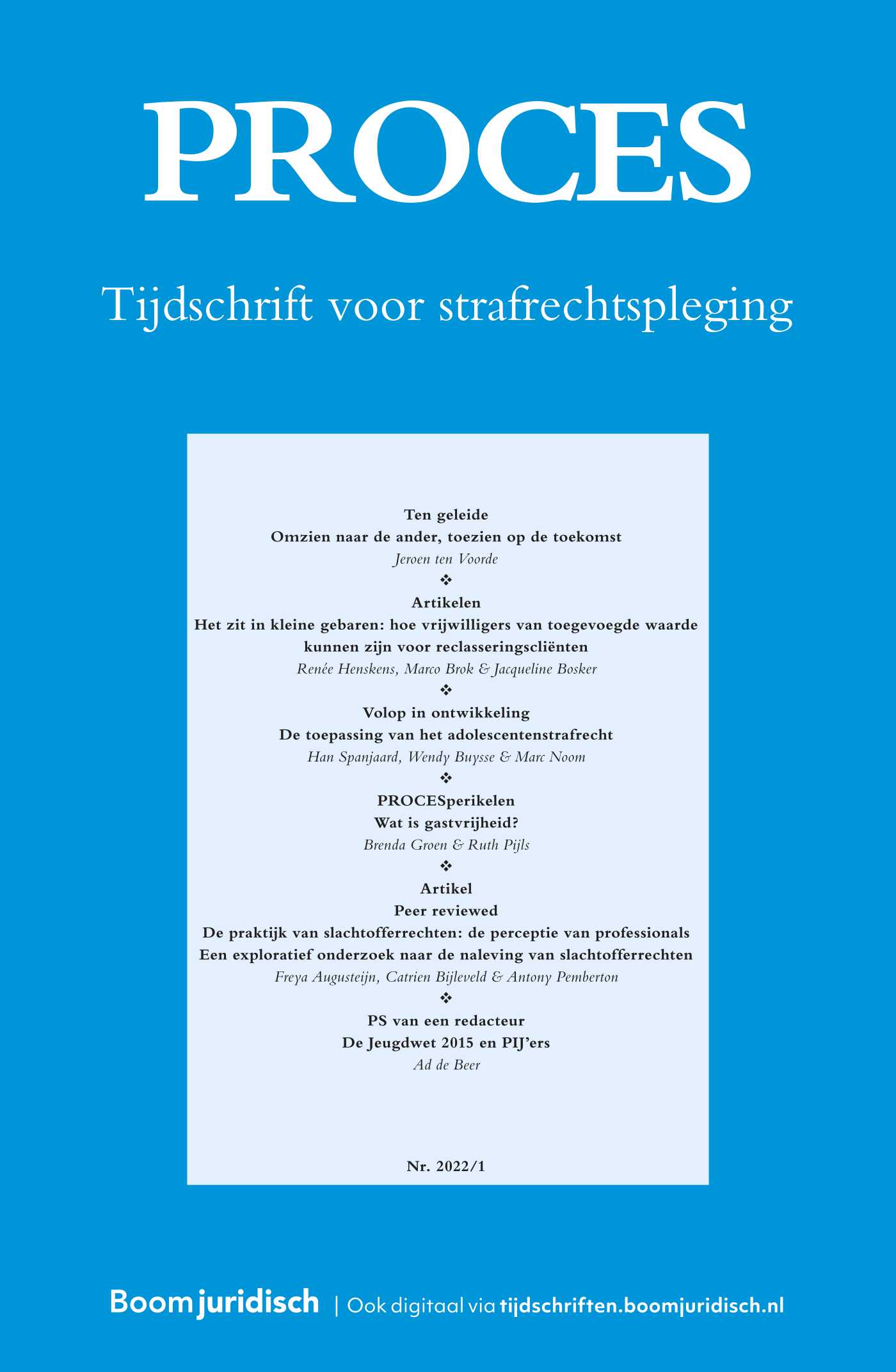|
Research on comprehensibility of the criminal process has focused on the verdict. However, much less studies have examined the comprehensibility of what is going on during court proceedings, in the eye of the laity. The focus of this article is on the comprehensibility of the linguistic usage of legal terms in court. Based on observations in the magistrates’ court, both quantitative and qualitative data was collected. Analysis shows an increase of comprehensibility when judges strictly follow the judicial procedure in court. Defendants do not always understand the legal terms and there appears to be a gap between the legal profession and the laity. |


PROCES
Meer op het gebied van Criminologie en veiligheid
Over dit tijdschriftMeld u zich hier aan voor de attendering op dit tijdschrift zodat u direct een mail ontvangt als er een nieuw digitaal nummer is verschenen en u de artikelen online kunt lezen.
| Redactioneel |
Tegenwicht bieden aan het populisme |
| Auteurs | Maartje van der Woude |
| Auteursinformatie |
| Artikel |
Zal ik het even uitleggen?Over de begrijpelijkheid van politierechterzittingen |
| Trefwoorden | procedurele rechtvaardigheid, begrijpelijkheid, legitimiteit, observatie |
| Auteurs | Roos de Jager, Sara Jonker, Desirée Röschard e.a. |
| SamenvattingAuteursinformatie |
| Artikel |
Drug courts in Nederland |
| Trefwoorden | drug court, Verslaafde, Behandelen, Zorg |
| Auteurs | Edwin ten Holte |
| SamenvattingAuteursinformatie |
|
For several years nonviolent substance abusing offenders in the United States of America and in the United Kingdom are tried by a specific Drug Court, in which the judge, the prosecutor, the probation officer and a case manager work together to help substance abusing offenders breaking the cycle of addiction and recidivism. Treatment and rehabilitation are the main goals of the Drug Courts. This article considers the benefits and traps of the introduction of the Drug Courts in The Netherlands. |
| Praktijk |
Motiveren… |
| Auteurs | Mr. Marco Bekkering |
| Auteursinformatie |
| Artikel |
Informeel toezicht tijdens de resocialisatie in een tbs-behandelingToepassing van FSNA als sociale interventie in de forensische psychiatrie |
| Trefwoorden | FSNA, forensische psychiatrie, significante netwerkleden, risicotaxatie |
| Auteurs | MSc Evelien Hoeben, Dr. Marinus Spreen, Drs. Marlies van den Berg e.a. |
| SamenvattingAuteursinformatie |
|
In this study Forensic Social Network Analysis (FSNA) as an social intervention method on behaviour of forensic psychiatric patients on leave is described. It is assumed that FSNA takes effect through social control and social support of significant network members. Fifteen patients from Forensic Psychiatric Centre Dr. S. van Mesdag (The Netherlands) and over fifty of their significant others have been interviewed during this study. The results imply that during the rehabilitation-phase less incidents and violations of parole orders were caused by patients on which FSNA was applied. This supports the positive role of significant others of patients during the rehabilitation-phase and perhaps in forensic psychiatric supervision. |
| Artikel |
Detentie en de ongewenste gevolgen voor inkomen en huisvesting van gedetineerden |
| Trefwoorden | nazorg, detentieschade, huisvesting, inkomen |
| Auteurs | Drs. Alexander More en Dr. Gijs Weijters |
| SamenvattingAuteursinformatie |
|
To reduce recidivism of former prisoners, the Ministry of Security and Justice aims at improving the reintegration of former prisoners into free society. The objective is to ensure that former prisoners have, among other things, an income and accommodation at the time they are released from prison. The article studies the changes in the extent that prisoners have an income and accommodation during imprisonment. Results show that before imprisonment 83% of the prisoners have some form of accommodation, 76,2% have a legal income and 70,2% have debts. During imprisonment 28,8% of the prisoners lose their income, and 5,5% of the prisoners lose their accommodation. |
| Column |
Geïnstitutionaliseerde verwaarlozing: de ‘Haagse’ en de ‘echte’ werkelijkheid |
| Auteurs | Jaap van Vliet |
| SamenvattingAuteursinformatie |
|
In a column a journal editor or an author expresses his or her opinion on a particular subject. |
